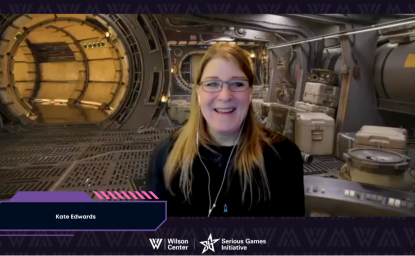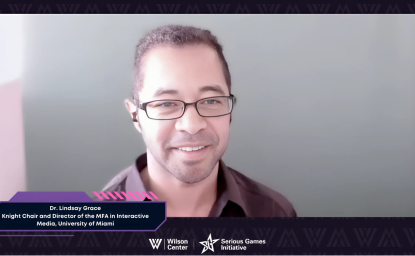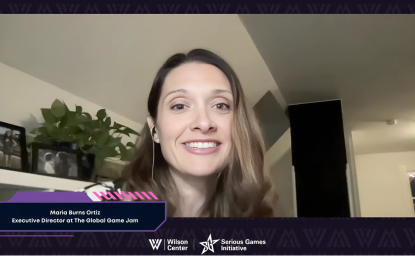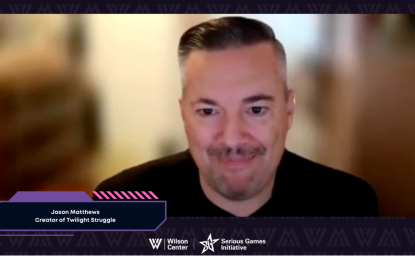Elizabeth Newbury:
Welcome to another video from the Serious Games Initiative here at the Wilson Center. Now, as you may know, the Serious Games Initiative is celebrating 20 years or 20 year anniversary, and that is of us developing, researching and convening great people around the pro social impacts of gaming. Throughout the decades, our approach has focused more on amplifying science policy and public policy issues through the medium of games, and some of our research that we do here because we are a think tank here at the Wilson Center. Some of our game titles include exciting titles like the Budget Hero series and The Fiscal Ship, which are about the federal budget. And then we have some recent games that focus on more of environmental policy, like our Plastic Pipeline game, which has won a Games for Change award recently. And then also AI's Anatomy and a couple of other suites about everyone's favorite topic of AI, but we also really try to focus on supporting the broader community of practice through our work here at the Wilson Center, and we have put together this series not just to celebrate the Serious Games Initiative, but to celebrate serious games more broadly in the greater field, to look at the past of serious games, the president of serious games and the future of serious games, and I have the great fortune today of being joined by Constance Steinkuehler, who has a lengthy research agenda as well as working policy approach to serious games. But I'll let Constance, I'll let you introduce yourself, if you would be so kind. So if you wouldn't mind telling us a little bit about how you orient towards serious games.
Constance Steinkuehler:
Sure, it's such a joy to be here with you. I started studying games somewhere back in like 2001 and there wasn't a lot of research on the medium. In fact, at that time, there was research that consisted of trying to evaluate games by nothing, but looking at their boxes, right? Games were a little bit of a taboo topic in academic research. So, you know, now, looking, you know, back, gosh, that's almost 25 years ago, and you see, like the proliferation, not just a really robust games research looking at what are the impacts of games, whether it's commercial game play, whether it's commercial game play that has been resituated for some positive outcomes, or whether it's games for impact that are built from the ground up for that impact, but it has just been kind of the golden age of research in many ways. Now games are kind of a standard form we they've even been integrated in ways where, for example, if you're studying flow, games would be used as the control condition, because they're so useful at creating flow type conditions for players. But games are now sort of a not uncommon, certainly no longer a taboo topic for research. And what's even more exciting, actually two things. One is, you know, I'm very interested in education, and really the kind of normalization of games as another medium that can be used in classrooms. That has completely happened, which is fantastic. And the third one is just the amount of development. I mean now, because game development platforms are more accessible, and because academic researchers, non for profit researchers, can actually work on projects, it's much more viable to build, like a, you know, a two hour game, a 20 hour game, and not necessarily have to compete with these ginormous budgets. There's a huge indie, thriving scene. And so you see a lot of, like, really terrific games for impact that are on the open market and succeeding as businesses, which is very exciting. So I feel like, you know, it's been a real blessing watching this kind of R&D really develop over the last 20 years or so, and of course, Wilson Center has been a huge part of that.
Elizabeth Newbury:
Well, thank you so much for that, but you were especially instrumental in getting folks like the Wilson Center booted up with our Serious Games Initiative. Could you describe a little bit about your thinking back two decades ago or so. What were you doing at that time? How did you I'm trying to very gently hint that you might have a policy background here. So could you describe a little bit about your journey with serious games.
Constance Steinkuehler:
Sure, of course. I mean, you know, so I was working under Jim Gee, James Paul Gee, who, of course, put out a book that had kind of seismically shifted our conversations, particularly in education, but in higher education more broadly, to take games seriously as a medium. And it was a pretty risky endeavor when he did it, but it just made a huge splash. And I was a grad student, and later, kind of an older grad student at that time, but I am, you know, he had advised me. I had been working on these projects with sort of DOD type grants, and looking at, I'm very interested in social interaction and cognition, and so I was looking at it in the context of chat rooms and other spaces, but struggling because it's hard to understand what people are capable of doing when they're not engaged in what they're actually asked to do, the tasks are asked to accomplish together. So he had recommended, Jim had recommended to me shift to games as a way to kind of eliminate this confounding problem of just, well, the fact that we were running trials and experiments, but the people, the activities we were giving were hardly representative of what people can do when they're invested in what they're trying to solve or do together. So I did, and at the time, you know, it was considered kind of a career killer, but I will say the chance to deal with such a creative medium was really, was really provocative to me, and I really loved being able to do some kind of empirical research. But in an environment, in a kind of ecosystem that included a lot of creative talent, I'm a big believer that having artists and theater people around in any kind of project is just a huge boon. So I did a lot of my first work looking at online games, and kind of, you know, trying to make, sort of trying to, sort of step back and ask the public to take them to think about, like the facts and data about, what do we know about games? Where are they problematic? But also, where could they be really productive? And I think because there really wasn't a lot of work out of that kind that was looking at commercial game play, looking at all ages, and looking at the cognitive, intellectual demands of the games, I think that my work kind of scratched an itch, so to speak, for the public, and then, of course, for policy. So I did get involved in policy. I served as the first kind of video game expert in the White House. I worked in the Office of Science and Technology Policy, which is the office inside the White House that advises on policy related to, among other things, technology. So I worked on that kind of policy work in DC, and then in partnership outside of it for a couple years. And it was really really pretty wonderful to do. I mean, the thing that I have so many good stories to tell about that work, but it was really inspiring. I mean, though you're talking about civil servants who are willing to give up, you know, companies, careers, stop everything, to go serve their country. And it's one of the most humbling things I've ever seen, like being surrounded by such incredibly brilliant people who are willing to, you know, work at like, half a normal summer sometimes in order to serve their country. And I find that very very inspiring. And of course, you know now, 20 years later, 25 years later, we have various organizations that have really helped buoy up the field of games for impact. In fact, I would say, I would just say games generally like taking games seriously as a medium, in the same way we would take film or television seriously, we would want to think about, you know, what are these media good for and for whom and when, and under what condition and what kind of work could they do for us as a democracy, as a citizen, as a global population, even. And I find those questions today still really endure, you know, I feel like we've gotten over that kind of hype cycle where it's like everyone's super excited and then they're super upset, because in 18 months, we didn't accomplish everything we wanted. But now what we have is now at least a good 10 years in this sort of, you know, what Gartner would call, that plateau of productivity, have this indie scene of games that include all sorts of titles that are on serious subjects, that are intended or not necessarily intended, but do have positive impact. And the player base is they're so open to indie games, there's not this kind of, what I would call like a pink ghetto where games for impact are now in this pink ghetto that that doesn't really exist anymore, there's just games, and there's good games, or not as good of games. So I feel like it's been a really exciting and productive last decade, really, I would say, of getting games out that address that aren't just like, aren't just entertainment and fun, which they are, of course, but also, you know, are transformative for human relationships, transformative for understanding, can be transformative for public service and our public sort of world and sphere, and also are kind of normalized in spaces like institutions. So you know now we we have many game design programs that's not uncommon on major universities. It's also not uncommon for teachers to use games to illustrate systems that are very hard to describe and understand through, just say, a textbook. So I feel like we're sitting in such a great place 20 years later, it's it's really inspiring.
Elizabeth Newbury:
It's gone from something taboo that's something that is more openly embraced, including in academic institutions like you're currently serving at, yeah, where do you think the field is going from here? What do you think is the next big thing for serious games?
Constance Steinkuehler:
Gosh, predicting their future is so hard, right? Yeah, I would love it to go, I mean, I would love it to go toward these really big, weighty questions that I think every American is, you know, kind of feels the burden of right now. I think that games that do more, that connect us and build trust and belonging rather than separate as I think that that is a space that games have this incredible, incredible power to connect people across all sorts of identities and all sorts of commitments that are outside the game. Games have this real potency there. And I would love to see some real work in that space, both digital games, analog games, all the forums. I mean, I would point to some incredible work, like Dan Cook's work on kind games where, he's organized this group of commercial game developers and designers to think about, like, you know, how do we make games that actually build trust among players? And I don't mean games where, you know, say I don't necessarily mean games that are like Eve for everyone, or Stardew Valley, which I love, or Animal Crossing, which I love. I mean games that use what we know about the basics of sociology and how trust happens, like repeated, safe interactions, right? Like, the less, not ideological, just sort of, you know, like, how do you how do you create a space where people feel like they're safe and like they can trust each other enough not to, like, have horrible insults hurled? I think that's one space I love seeing more development in, and I would love also for us to bend games and games for impact toward, again, some of these really tough national problems we have. You know, Americans are not all equally understanding about how a democracy works. Many of the feedback functions in a democracy, if you thought about it like a game, it's a horribly broken game, like it's very hard to understand how to participate, or to see the impacts of participation, especially when those impacts happen at an aggregated level. I love the idea of more games, just like what Wilson Center sort of launched with, which was, you know, the game on the federal budget, thinking about games that might help the public understand our own governance systems that are otherwise pretty opaque and they're complicated, they're not easy to understand. And so I think that both the social agenda and then also sort of, for me, the kind of democracy and engagement and being a good, a good like engaging in civic participation and being a good citizen, right? What does that mean? How do we cultivate that? How do we convey understanding and how those systems work and also inspire people you know, to kind of make that kind of engagement cool again? I would say it's always cool, but I don't know, yeah.
Elizabeth Newbury:
I think, we're a little biased, but like, yeah, civic engagement has always been cool, guys. But it's a really that's a really valuable insight, and how we can use games to both promote and engage core issues within games, but how also games might be able to be used to sort of provide a feedback cycle. Yeah, that's really cool. Are there any projects that you're working on right now that sort of feed into that line?
Constance Steinkuehler:
Oh my gosh, yes, I have to say. So we just finished a study that was about, I guess it's been about three years working on it, looking at, you know, I've always focused on social and I'm very interested in social interaction, what people do together. I adore studying people in groups, especially so, you know, we did a study that was on sort of the darker side of online games, because I've spent so much time looking at the benefits, so looking at things like toxicity and hate speech, and what happens in commercial games when people are persistently exposed to this kind of behavior, like, when do they drop out? How do they respond? What are the consequences? And also looking at things like, you know, does exposure to hate normalize hate? And it turns out, yeah, it does, right? It does normalize it. So after that, you know, I'm an educator at heart, and I like focusing on the solution. So if I'm going to talk about a problem, I like to talk about a solution. So now I've been sort of pivoting my work and doing more of trying to do kind of an analysis of what are the programs that are out there that are targeting specifically, like normalizing social relationships across, you know, race lines, across power differences, some of the greatest, can I just like, talk about a program or two? So I'll give you an example. So I'm here in California. I'm at University of Irvine, California. There is a program happening at San Quentin maximum security. It's now a rehabilitation center, not just a prison. And there is an incarcerated individually led organization that is using games, and they've been doing this for almost two years now. It's called San Quentin SkunkWorks. And some incarcerated individuals decided to start doing these monthly game events as a way for incarcerated prisoners and sometimes guards, to play together in a space where they could for a while, set aside some of the self-segregation that happens racially, unlike, you know, the open yard for activity, or some of the power, the incredible power differences between a guard and someone who's incarcerated. And there's been, there's been some great press, like in the LA Times, about these programs. What they're trying to do is totally incredible and so obvious. And yet, when you see it, you think it's so obvious. And yet, so few people are doing it. They're just creating a space where people can just sort of like, drop all the pretenses and all of their sort of outside identities and come in and just spend a couple hours together, for example, with, you know, with correction officers and incarcerated people like playing checkers together or partnering to battle another, you know, guard inmate team in chess or checkers, or having like roll top role playing games like D&D variants, where we're incarcerated individuals that are in different gangs, different you know, racially segregated can actually spend a few hours just hanging out together, and I will say I was just up there a few weeks ago. And these events are so potent for the participants, and they're so they're so provocative in the way that they sort of offer an alternative version of what we might think of as like, could we just at some point, kind of normalize some relationships. So there are some really incredible efforts like that out there that are having significant impacts in places that you would think having impact would be so difficult, right? Like, can you imagine a harder case than correction officers and incarcerated individuals at a maximum security prison. So if they can accomplish this through such vastly different, you know, subgroups in the population, if they can do that inside a maximum security prison, and have incredible success, imagine what we could do if we just, sort of like, re embraced play as a space for us to treat one another with a kind of dignity and joyfulness. And, you know, instead of being what we often feel, which is increasingly afraid,
Elizabeth Newbury:
Yeah, the capacity for play to like, build bridges across, allow people to sort of set their biases at the door.
Constance Steinkuehler:
Absolutely, you know. And it's not always about, you know, it's not always about forming best friendships. Sometimes it's about reminding ourselves that we all have enough shared pleasure in the same kind of activities, and that we're all similar enough that, you know, none of us are nothing but a political viewpoint. None of us are nothing but our worst mistake, people are complicated, and they're pretty amazing. So it's really wonderful to see events and organizations start to, you know, kind of bubble up to the top that are using games as a space just for us to be together again. And I think that that's really an incredible thing that games do without really even having to try, right?
Elizabeth Newbury:
Yeah, that's a that's a very inspirational story. Thank you so much for sharing it. And we'll provide some links down below for some of the sources that you've cited throughout. And if you have any research that you would like us to also include, we're happy to do that.
Constance Steinkuehler:
Oh, that's fantastic.
Elizabeth Newbury:
Thank you so much. I wish I could talk to you for another hour, but I want to be respectful of your time, and thank you so much for joining us today to talk about some of your work, some of your insights into the history of serious games. And I can't wait to see what comes out of your lap next.
Constance Steinkuehler:
Oh, Elizabeth, it's such a pleasure. And thank you for being such an incredible leader in this space, the work you're doing is just incredible. I'm so glad to be part of it.
Elizabeth Newbury:
Everyone have a great day.









